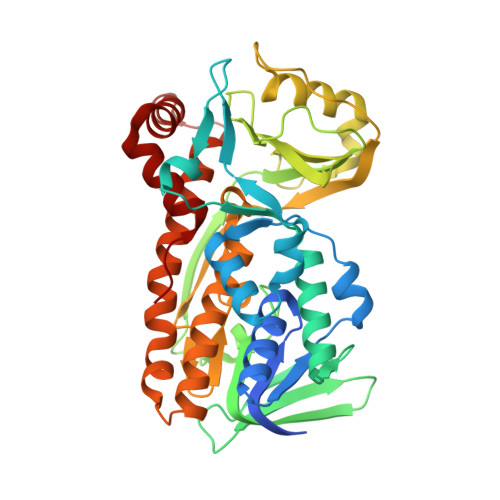Protocatechuate hydroxylase is a novel group A flavoprotein monooxygenase with a unique substrate recognition mechanism.
Katsuki, N., Fukushima, R., Doi, Y., Masuo, S., Arakawa, T., Yamada, C., Fushinobu, S., Takaya, N.(2023) J Biol Chem 300: 105508-105508
- PubMed: 38029967
- DOI: https://doi.org/10.1016/j.jbc.2023.105508
- Primary Citation of Related Structures:
8JQO, 8JQP, 8JQQ - PubMed Abstract:
Para-hydroxybenzoate hydroxylase (PHBH) is a group A flavoprotein monooxygenase that hydroxylates p-hydroxybenzoate to protocatechuate (PCA). Despite intensive studies of Pseudomonas aeruginosa p-hydroxybenzoate hydroxylase (PaPobA), the catalytic reactions of extremely diverse putative PHBH isozymes remain unresolved. We analyzed the phylogenetic relationships of known and predicted PHBHs and identified eight divergent clades. Clade F contains a protein that lacks the critical amino acid residues required for PaPobA to generate PHBH activity. Among proteins in this clade, Xylophilus ampelinus PobA (XaPobA) preferred PCA as a substrate and is the first known natural PCA 5-hydroxylase (PCAH). Crystal structures and kinetic properties revealed similar mechanisms of substrate carboxy group recognition between XaPobA and PaPobA. The unique Ile75, Met72, Val199, Trp201, and Phe385 residues of XaPobA form the bottom of a hydrophobic cavity with a shape that complements the 3-and 4-hydroxy groups of PCA and its binding site configuration. An interaction between the δ-sulfur atom of Met210 and the aromatic ring of PCA is likely to stabilize XaPobA-PCA complexes. The 4-hydroxy group of PCA forms a hydrogen bond with the main chain carbonyl of Thr294. These modes of binding constitute a novel substrate recognition mechanism that PaPobA lacks. This mechanism characterizes XaPobA and sheds light on the diversity of catalytic mechanisms of PobA-type PHBHs and group A flavoprotein monooxygenases.
Organizational Affiliation:
Faculty of Life and Environmental Sciences, Microbiology Research Center for Sustainability, University of Tsukuba, Tsukuba, Ibaraki, Japan.
















